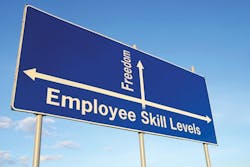How many times have you seen an excellent estimator or a top-notch technician get promoted to a management position, then seem to lose his or her touch, floundering in the job even though they know how to run the floor?
Have you ever seen a new manager take control, full of energy and ideas, then before long become steeped in every employee’s problems and fall flat as a leader?
Often, a body shop manager or leader who’s promoted from within has been set up to fail, primarily because they’ve learned to manage their former jobs, not to manage people. Of course, no shop owner who is guilty of doing so has done it on purpose—they simply haven’t learned how best to manage employees, either.
For the faltering manager and failing boss, a key that might open the door to success for both of them is job delegation. The ability to assign tasks to other employees, where each is presumed to have various levels of competence, can mean the difference between smooth-running success and stumbling over trivialities that shouldn’t get in the way.
LEADERS DEVELOP
Kevin Wolfe spent 20 years in the family’s successful automotive service business, which was all well and good until it came time for his father to retire, which coincided with the company’s rapid growth. Challenges mounted until one day Wolfe realized, “My leadership, or lack thereof, was the difference.”
He began talking to and working with others who were running businesses, to leaders and to trainers, to improve his performance at work. And as Wolfe improved, so did the business.
“We became the employer of choice and the provider of choice,” he recalls. “Everybody started to have more fun, and the clients kept coming.”
And, the competition noticed. “How did you do it?” he was asked, repeatedly. Soon Wolfe realized he felt more passionately about teaching this process of management and leadership than he did about running the business, so he sold it. Some 15 years later, Wolfe is the owner of LeadersWay, Inc., coaching senior managers and executives to a higher level of performance.
One of the main lessons that Wolfe’s students learn is how to delegate tasks to their employees and distribute responsibility.
“Delegation is about getting people in control of their jobs,” Wolfe says. “If done properly, delegation is quite the win-win. I do less as manager and I get to do more of what I should be doing and that’s developing people. And you’re happier because you’re being productive.
“It’s very good for the self-image, to be productive. And delegation accomplishes that.”
OWNERSHIP OF RESPONSIBILITY
A common flaw of the former “top producer” who has been promoted to manager is that sometimes, when presented with an employee’s problem, the new manager’s instinct is to jump in and to do the task for them.
“Delegation is about getting responsibility to the people who own that responsibility,” Wolfe says. An energetic new manager might come with great ideas for improvement, but if they’re not delegating, if they’re not nurturing their talent, they just get busier and busier.
“And that whole negative landslide of thoughts and emotions starts,” Wolfe says. The overburdened manager begins to think, “These people that I have are just losers and they can’t get anything done,” and this situation is predictable for managers without delegation skills.
Part of what Wolfe teaches is that managers and leaders get paid to influence behavior and to get people to do things. “What we teach is choice coaching, and this is about giving people control,” he says. “As a manager, I’m here to answer your question and to help you, and it would be easy for me to answer this, but would I be doing you any favors?”
Rather than simply telling employees what to do, effective managers will support the employee and give him or her the tools to figure out a solution on their own.
“It allows everyone to be productive,” Wolfe says. “Done well, delegation means getting the best out of your workforce.”




